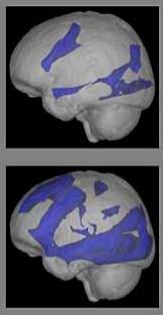Is the internet making us smarter, dumber – or, in some weird way, both?
Researchers all over the world are currently studying the measurable effect of internet use on the thought processes, memories, and behavior of humans. What they’re discovering, and what they predict, is reassuring and frightening in equal measure.

The researchers all agree on one point: the internet is changing us in very real ways.
On the plus side, brain scans done while subjects read printed material and while they surf the net show that the internet challenges the human brain significantly more than a book or magazine does, with twice as many neurons firing. The longer subjects used the internet, the more brain activity they showed. (These images are from scans done at UCLA comparing beginners and more savvy users.) What parts of the brain get caught up in the web? The areas used for decision-making and complex thought. This could be taken as proof that internet use boosts human intelligence.
But is it also changing the very definition of intelligence?
Some scientists believe we are losing the ability to absorb information and store it in our brains in a static fashion. Constantly switching from site to site on the internet – and back and forth between the web and e-mail – is destroying our attention span. We are losing direction and focus, not to mention our memories. We don’t have to remember information that is always available online.
Not everybody thinks this is a bad thing. As reported in a publication called Ideas and Discoveries, computer technology specialist Paul Jones believes that “once we spend less time on remembering things” we’ll have more brain space for new analytical skills.
Researcher Christine Greenhow of the University of Minnesota, also quoted in I&D, believes we will define intelligence differently a mere decade from now. She predicts we will see it as the ability to “condense widely distributed bits of information into a coherent form.”
Our brains are evolving with every keystroke and mouse click.
How do you feel about all this? Has the internet caused changes in the way your own brain functions?











11 comments:
Well, this is convenient. Just about the time I'm losing my memory to old age, scientists decide I don't need it any more. Thanks!
What was the question again?
I have a terrible memory for faces/names -- I'll usually remember one or the other, but seldom both at the same time. I wish the internet could help me with that.
Interesting post, Sandy. For some time now, I've referred to my laptop as 'my brain in a box.' Together we make a pretty good thinker.
The new issue (Feb 14 & 21) of The New Yorker just came in the mail, and I see it has reviews of several new books about this very subject -- how the internet is changing our brains and redefining intelligence.
What a fascinating topic. I know that I live alone, and the internet connects to some wonderful and interesting people. All that keeps me thinking, and I feel engaged with many issues, and topics. I think the learning curve is increased, and continues to grow, all of which has ramifications for the older person like me. The only downside is that it may change the way we thing, and I sometimes get impatient which the slow serious words of a talking head on the radio, and TV. I will check out the article. When i get tired, I read, or laugh with my "real" people.
I think it's changing the way we TRY to think, but I'm not sure our gray matter has caught up yet. We grew our brains back on the savannah, which taught us to pay attention to tigers, but now virtual tigers are everywhere. It's mentally exhausting.
I also read an article that verified that, yes indeed, older brains lose some ability with short-term memory, so there goes names and whatsits and those other things. BUT deep memory and the ability to connect all that deep data into meaningful patterns got even stronger. You know. Wisdom. Take that, you whippersnappers!
I do think it's discouraging deep thinking. I think we know a little thing about many subjects, but not in depth. I force myself away from the computer, and go read in another room, and I swear I'm like Pavlov's dog, I hear the e-mail chime and I have to force myself to stay seated. I do think the Internet for some is addicting.
I think it's affecting our ability to concentrate. Reading on the web means quickly understanding how the age is laid out, scanning for links and usually dealing with bite-sized chunks of information.
It's comforting to get lost in a novel once in a while.
What I've read suggests that our brains will rewire themselves over time so that our thinking is no longer linear.
I think whatever the changes are, they will be so gradual that we as a society or as thinkers will not really notice them.
Post a Comment